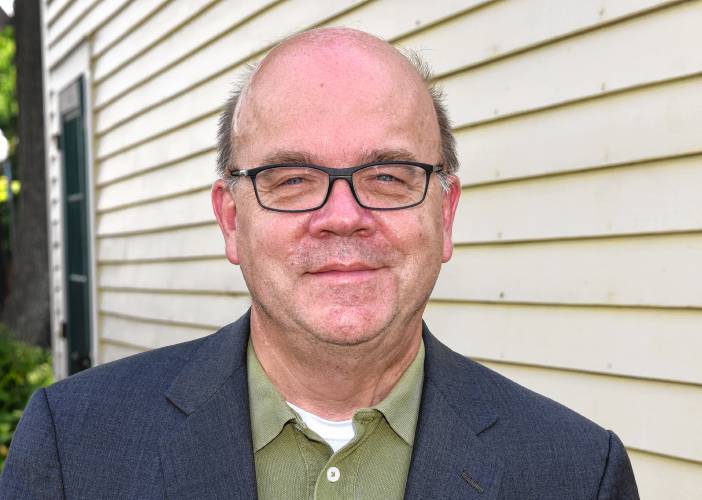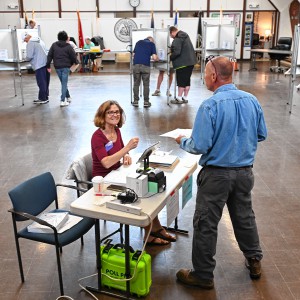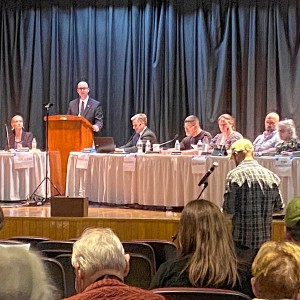McGovern bill would suspend dozens of pesticides banned in other countries pending EPA review

JIM McGOVERN
| Published: 09-03-2023 2:37 PM |
U.S. Rep. Jim McGovern has introduced a bill in Congress that could ban dozens of pesticides in the United States, including many banned in other countries.
The bill, known as the Protect America’s Children from Toxic Pesticides Act, would update current federal regulations to immediately suspend more than 70 pesticides that are already banned in either the European Union or Canada, pending further review, as well as call on the Environmental Protection Agency to be more stringent in regulating pesticides.
The bill states that the EPA “regularly fails to incorporate updated scientific understanding to protect human health and the environment from the harmful effects of pesticide products, as envisioned by the Federal Insecticide, Fungicide and Rodenticide Act.”
The bill goes on to say that “the United States lags behind the European Union and other developed nations in protecting its people and its environment from toxic chemicals.”
In a statement announcing the bill, McGovern said the EPA had been hobbled in its regulatory efforts to ban pesticides by businesses that have fought to keep them legal through lobbying efforts.
“American families and farmworkers should not be subjected to toxic pesticides that have been banned in other countries because of serious adverse health impacts,” McGovern said in a statement. “Sadly, corporate greed has corroded the EPA’s ability to protect human health and our environment.”
In addition, the bill calls for ending delays on EPA reviews on pesticides, with any review that does not meet deadlines resulting in the pesticide’s automatically being deemed dangerous. It also states the EPA must look at all relevant evidence when reviewing a given pesticide, such as epidemiological studies, peer-reviewed literature, and government data generated either at the state or federal level or by a foreign government.
According to McGovern’s statement, the United States uses more than 1 billion pounds of pesticides annually, about a fifth of worldwide use. One-third of that amount is made up of pesticides that are banned in the European Union. Glyphosate, a popularly used pesticide in the United States that is found in products like Roundup, is currently scheduled to be banned in the European Union beginning in December, and would be suspended should both the European ban take effect and the bill pass.
Article continues after...
Yesterday's Most Read Articles
 Political newcomer defeats Shores Ness for Deerfield Selectboard seat
Political newcomer defeats Shores Ness for Deerfield Selectboard seat
 South County Senior Center opts not to renew church lease after rift over LGBTQ program
South County Senior Center opts not to renew church lease after rift over LGBTQ program
 More than 130 arrested at pro-Palestinian protest at UMass
More than 130 arrested at pro-Palestinian protest at UMass
 As I See It: Between Israel and Palestine: Which side should we be on, and why?
As I See It: Between Israel and Palestine: Which side should we be on, and why?
 Moratoriums on large-scale solar, battery storage passed in Northfield
Moratoriums on large-scale solar, battery storage passed in Northfield
 Bridge of Flowers in Shelburne Falls to open on plant sale day, May 11
Bridge of Flowers in Shelburne Falls to open on plant sale day, May 11
The bill has been endorsed by several organizations, including United Farm Workers of America, American Society for the Prevention of Cruelty to Animals and local organizations such as the Northeast Organic Farming Association of Massachusetts, based in Florence.
Renée Scott, pollinator network coordinator for the organic farming association, said in a statement that pesticides are responsible for population decline of pollinator species such as bees.
“This bill is critical to addressing one of the main contributors to pollinator species’ collapse — the uncontrolled use of pesticides that are poisoning our environment, leading to the breakdown of ecosystems, which in turn contribute to climate change and biodiversity loss,” Scott said.
Although she said she supports McGovern’s bill, Ashfield resident and pesticide activist Delta Carney said the proposed legislation is “a day late and a dollar short.” While this bill would stop people from being exposed to some dangerous chemicals, she argued there are many more pesticides that need to be regulated. Carney said corporate greed often takes precedence over safety, and there are many cases where decades later the public finds out that companies knew about the dangers.
“When big companies say their pesticides are safe, they lie through their teeth,” Carney said. “The legislation McGovern proposed absolutely has to go through. We need to do a whole lot more of that.”
In municipalities within McGovern’s congressional district, including in the Pioneer Valley, local pesticide bans have taken effect. In 2019, the Northampton City Council passed an ordinance banning the use of pesticides on city-owned parks, fields, and playgrounds unless there is an emergency that poses an immediate threat.
Alexander MacDougall can be reached at amacdougall@gazettenet.com. Reporter Bella Levavi contributed to this article.

 Retired police officer, veteran opens firearms training academy in Millers Falls
Retired police officer, veteran opens firearms training academy in Millers Falls No surprises in Wendell election
No surprises in Wendell election New Salem election ushers in new Selectboard member
New Salem election ushers in new Selectboard member
